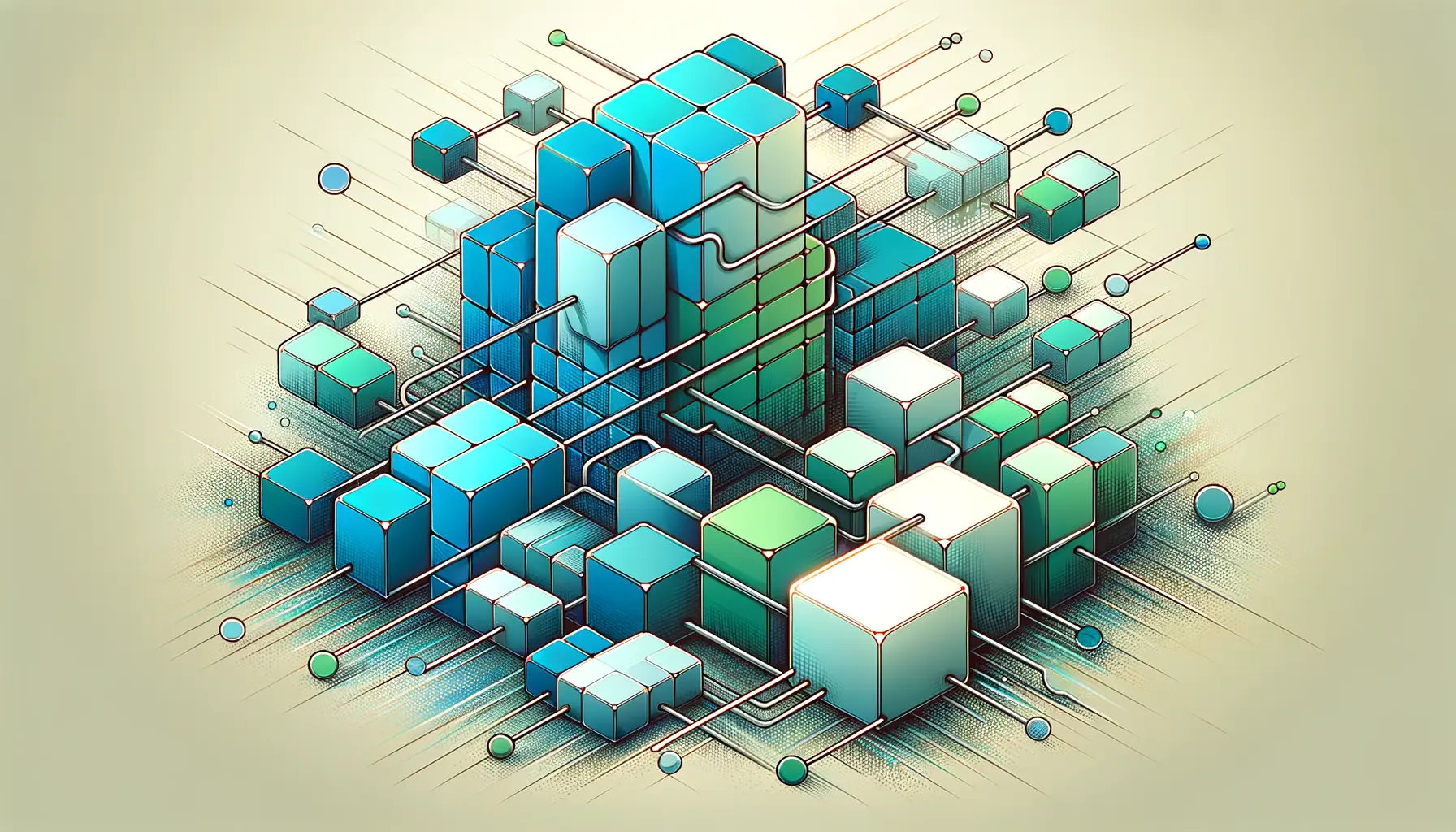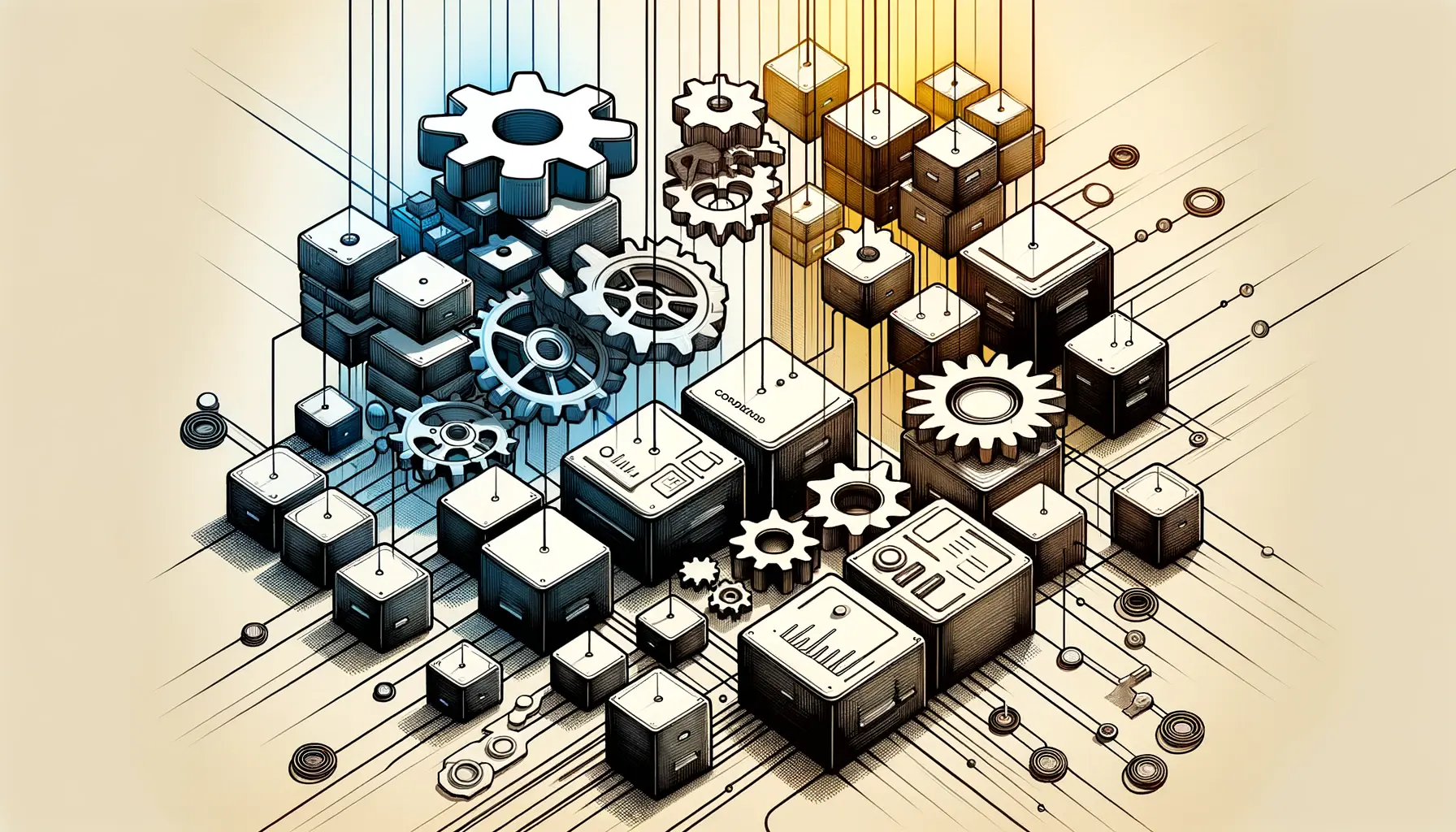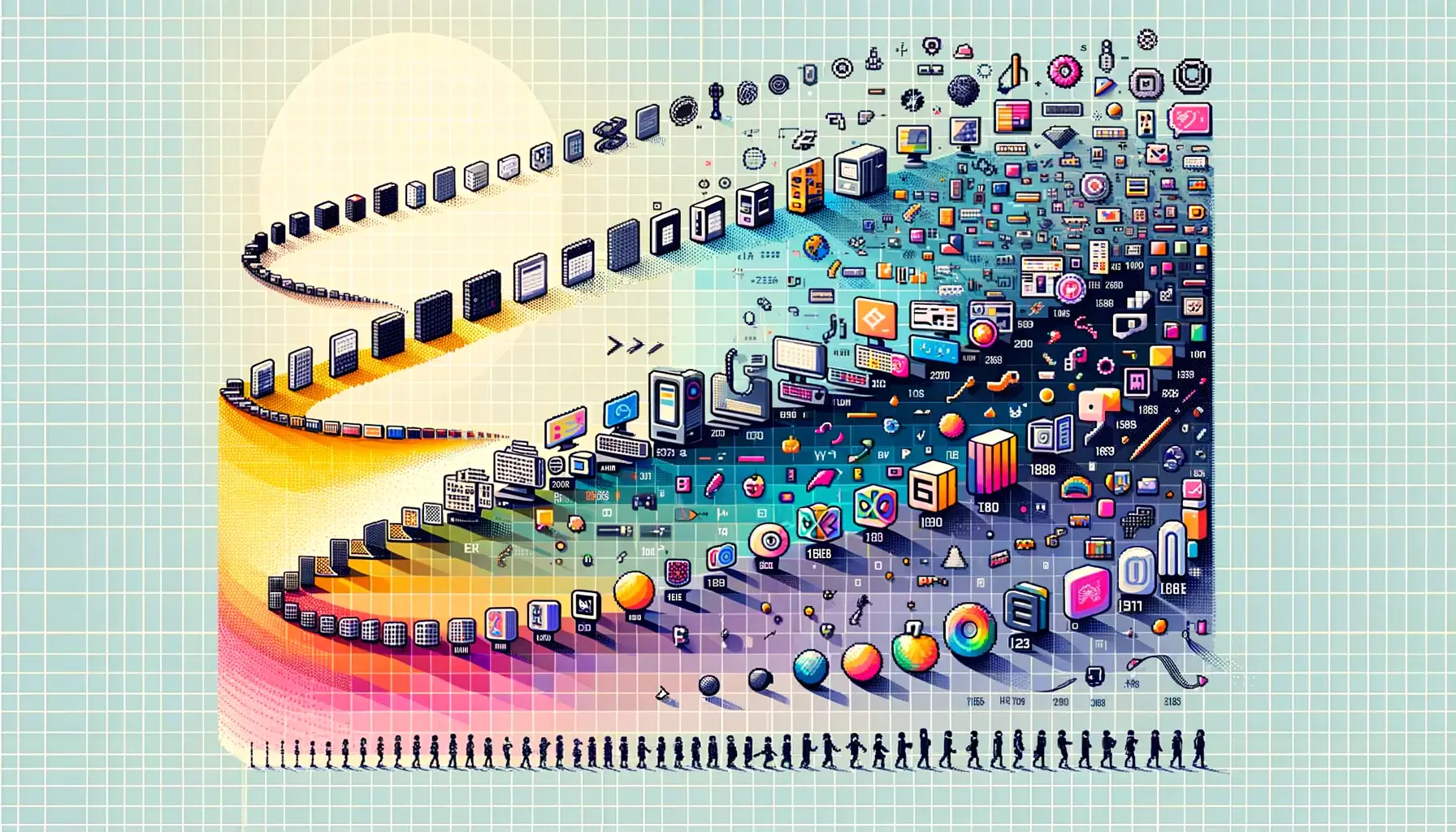The digital landscape is undergoing a significant transformation, thanks to the advent of blockchain technology.
This innovation is not just reshaping the financial sector but is also making waves in web development.
Blockchain, a decentralized ledger technology, is introducing new paradigms of security, efficiency, and transparency in the way web applications are developed and managed.
Its impact on web development is profound, offering a glimpse into a future where web applications are more secure, user-centric, and independent of central authorities.
At the heart of this transformation is the blockchain’s ability to provide a secure, transparent, and tamper-proof environment for transactions and data exchange.
This capability is particularly appealing in the realm of web development, where security and data integrity are paramount.
The decentralized nature of blockchain means that information is not stored in a single location but is distributed across a network of computers, making it nearly impossible to hack or tamper with.
This article explores the multifaceted impact of blockchain technology on web development, highlighting its potential to revolutionize the field.
- Decentralizing Web Infrastructure
- Streamlining Transactions with Smart Contracts
- Tokenization and the Rise of Web 3.0
- Blockchain’s Role in Enhancing User Experience
- Challenges and Considerations in Blockchain Integration
- Future Trends in Blockchain and Web Development
- Blockchain’s Impact on E-commerce and Online Marketplaces
- Revolutionizing Web Development: The Blockchain Paradigm
- FAQs: The Impact of Blockchain Technology on Web Development
Decentralizing Web Infrastructure
The traditional web development model relies heavily on centralized servers and databases, making it susceptible to single points of failure and attacks.
Blockchain technology, with its decentralized nature, offers a compelling alternative.
By distributing data across a network of nodes, blockchain minimizes the risks associated with centralization.
This shift towards a decentralized web infrastructure not only enhances security but also promotes a more democratic and equitable internet, where users have greater control over their data.
Decentralization also opens up new avenues for creating resilient and fault-tolerant web applications.
In a blockchain-based model, web applications can continue to operate smoothly even if parts of the network go down, ensuring uninterrupted service for users.
This resilience is particularly crucial in today’s digital age, where downtime can have significant financial and reputational consequences.
Enhancing Data Security and Privacy
One of the most significant impacts of blockchain on web development is the enhancement of data security and privacy.
The cryptographic algorithms used in blockchain technology ensure that data is securely encrypted and can only be accessed by authorized parties.
This level of security is a game-changer for web development, where data breaches and privacy concerns are rampant.
Moreover, blockchain enables users to have more control over their personal information.
Through decentralized identity management systems, users can manage their digital identities without relying on central authorities.
This approach not only bolsters privacy but also reduces the risk of identity theft and fraud.
Blockchain technology is setting the stage for a new era in web development, characterized by decentralized infrastructures, enhanced security, and greater user empowerment.
Streamlining Transactions with Smart Contracts
Smart contracts are self-executing contracts with the terms of the agreement directly written into code.
They are one of blockchain’s most innovative contributions to web development, automating transactions and enforcing agreements without the need for intermediaries.
This automation not only streamlines processes but also significantly reduces the potential for human error and fraud.
The integration of smart contracts into web development opens up a plethora of possibilities for creating more efficient and transparent online services.
For instance, e-commerce platforms can automate payments and order fulfillment processes, ensuring that transactions are executed only when predefined conditions are met.
This level of automation and trustworthiness is unprecedented in traditional web development practices.
Facilitating Decentralized Applications (DApps)
Blockchain technology is the backbone of decentralized applications (DApps), which operate on a peer-to-peer network rather than a single server.
DApps represent a shift away from conventional web applications by offering an open-source, transparent, and censorship-resistant alternative.
The development and deployment of DApps on blockchain platforms such as Ethereum are redefining what is possible in web development, from social media platforms to online marketplaces.
The benefits of DApps include improved security, as there is no central point of failure, and enhanced user control over personal data.
Additionally, DApps can run autonomously, with changes and improvements governed by consensus among users.
This democratic approach to web application development and management is fostering a new level of user engagement and community-driven innovation.
- Key Advantages of Smart Contracts and DApps:
- Automated transactions that reduce the need for intermediaries.
- Enhanced security and reduced fraud potential.
- Increased transparency and trust in online services.
- Greater user control over personal data and digital identities.
- Community-driven development and governance.
The adoption of smart contracts and DApps is not just a technological upgrade but a paradigm shift towards more transparent, secure, and user-centric web development.
Tokenization and the Rise of Web 3.0
The concept of tokenization, powered by blockchain technology, is revolutionizing the way assets are created, distributed, and traded online.
Tokenization involves converting rights to an asset into a digital token on a blockchain, facilitating the secure and efficient transfer of ownership.
This process is at the heart of the emerging Web 3.0, a new internet era characterized by decentralized networks, digital assets, and user sovereignty.
For web developers, tokenization opens up new possibilities for creating value and monetizing online platforms and applications.
From digital art and music to real estate and intellectual property, virtually any asset can be tokenized and traded on blockchain networks.
This not only democratizes access to investment opportunities but also creates more fluid and efficient markets.
Empowering Users with Digital Identity and Privacy
Blockchain technology is redefining concepts of digital identity and privacy on the web.
By enabling secure, decentralized identity management systems, blockchain gives users unprecedented control over their personal information.
This shift has significant implications for web development, as it changes how user data is collected, stored, and utilized.
Web applications can leverage blockchain-based identity solutions to offer users a more secure and private online experience.
Instead of relying on centralized entities for identity verification, users can prove their identity through cryptographic proofs, reducing the risk of data breaches and identity theft.
This approach not only enhances user privacy but also streamlines the user experience by eliminating the need for multiple usernames and passwords.
- Implications of Tokenization and Digital Identity:
- Creation of new business models based on digital assets and token economies.
- Increased liquidity and accessibility of various asset classes.
- Enhanced user control over personal data and digital identities.
- Improved privacy and security in online interactions.
- Streamlined user authentication and access control.
The integration of tokenization and digital identity management into web development is paving the way for more secure, efficient, and user-centric online ecosystems.
Blockchain’s Role in Enhancing User Experience
The influence of blockchain on web development extends beyond security and decentralization to significantly enhance the user experience (UX).
By enabling faster, more secure transactions and creating a more transparent environment, blockchain technology can improve how users interact with web applications.
This improvement in UX is crucial for businesses looking to retain customers and build trust in their online platforms.
Moreover, blockchain facilitates a smoother and more efficient user journey by minimizing the need for repetitive authentication processes and reducing transaction times.
For example, blockchain’s ability to securely store user preferences and data across different applications can lead to a more personalized and seamless web experience, without compromising user privacy.
Reducing Friction in Online Transactions
Blockchain technology significantly reduces friction in online transactions by eliminating intermediaries and streamlining processes.
Smart contracts, for instance, automate and enforce the terms of agreements directly within the blockchain, speeding up transactions while ensuring their security and transparency.
This reduction in transaction time and complexity can greatly enhance the user experience, making online services more attractive and accessible.
Additionally, the use of cryptocurrencies for online payments can further reduce friction by enabling instant, borderless transactions with lower fees compared to traditional payment methods.
This is particularly beneficial for international transactions, where blockchain can simplify currency conversion and compliance with local regulations.
- Benefits of Blockchain for User Experience:
- Enhanced security and privacy, leading to increased user trust.
- Streamlined transactions and reduced need for intermediaries.
- Personalized web experiences through secure data management.
- Instant, low-cost online payments with cryptocurrencies.
- Improved accessibility and convenience for international users.
Blockchain technology is not only transforming the technical aspects of web development but also redefining the standards for user experience in the digital age.
Challenges and Considerations in Blockchain Integration
While the integration of blockchain technology into web development offers numerous advantages, it also presents several challenges and considerations.
One of the primary hurdles is the steep learning curve associated with understanding blockchain technology and its application in web development.
Developers must acquire new skills and knowledge to effectively leverage blockchain’s potential, which can be time-consuming and resource-intensive.
Another significant challenge is scalability.
As blockchain networks grow in size and complexity, they can face issues related to transaction speed and network congestion.
This scalability challenge requires innovative solutions to ensure that blockchain-based web applications can handle large volumes of transactions without compromising performance.
Interoperability and Standardization
Interoperability between different blockchain platforms and existing web technologies is another critical area of concern.
For blockchain to achieve widespread adoption in web development, there needs to be a seamless way for different blockchain networks to communicate with each other and with traditional web platforms.
This requires standardization of protocols and interfaces, which is an ongoing effort within the blockchain community.
Moreover, regulatory and legal considerations play a significant role in the integration of blockchain into web development.
The decentralized and immutable nature of blockchain raises questions about data privacy, compliance with regulations such as GDPR, and the legal enforceability of smart contracts.
Navigating these legal complexities is crucial for developers and businesses looking to adopt blockchain technology.
- Key Challenges in Blockchain Integration:
- Learning curve and the need for specialized blockchain knowledge.
- Scalability issues related to transaction speed and network congestion.
- Lack of interoperability between different blockchain platforms.
- Regulatory and legal considerations surrounding data privacy and smart contracts.
Despite these challenges, the ongoing development and maturation of blockchain technology are addressing these issues, paving the way for more robust and scalable blockchain-based web applications.
Future Trends in Blockchain and Web Development
The intersection of blockchain technology and web development is poised for significant evolution in the coming years.
As blockchain matures and overcomes its initial hurdles, we can anticipate several future trends that will shape the landscape of web development.
One such trend is the increasing adoption of blockchain for mainstream web applications, beyond its current use in cryptocurrencies and financial transactions.
This broader application will revolutionize how data is stored, shared, and managed across the web, making decentralized applications more common.
Another trend is the development of more user-friendly blockchain tools and platforms that lower the barrier to entry for web developers.
These tools will simplify the process of integrating blockchain into web applications, making it accessible to a wider range of developers without deep expertise in blockchain technology.
Advancements in Blockchain Scalability and Interoperability
Advancements in blockchain scalability and interoperability are also on the horizon.
Solutions like sharding, layer 2 protocols, and cross-chain technologies are being developed to address the scalability challenges faced by existing blockchain networks.
These advancements will enable blockchain networks to process transactions more quickly and efficiently, making them more suitable for high-volume web applications.
Interoperability between different blockchain platforms will improve, facilitating seamless data exchange and interaction between various blockchain-based applications.
This will open up new possibilities for collaborative and cross-functional web applications that leverage the strengths of multiple blockchain networks.
- Emerging Trends in Blockchain Web Development:
- Broader adoption of blockchain across various web applications.
- Development of user-friendly blockchain integration tools for developers.
- Scalability solutions to support high-volume transactions on blockchain networks.
- Improved interoperability between different blockchain platforms.
- Increased focus on user privacy and data sovereignty in web applications.
As blockchain technology continues to evolve, its integration into web development will not only enhance the technical capabilities of web applications but also redefine the principles of digital trust, security, and user empowerment.
Blockchain’s Impact on E-commerce and Online Marketplaces
The e-commerce sector is witnessing a transformative shift with the integration of blockchain technology, heralding a new era of transparency, security, and efficiency.
Blockchain’s decentralized nature offers a robust solution to many of the challenges faced by online marketplaces, including fraud prevention, secure transactions, and supply chain transparency.
By leveraging blockchain, e-commerce platforms can provide a more trustworthy and user-friendly shopping experience.
One of the key benefits of blockchain for e-commerce is the facilitation of secure and transparent payments.
Cryptocurrencies and blockchain-based payment systems can significantly reduce transaction fees and processing times, making online shopping more cost-effective for both consumers and merchants.
Additionally, smart contracts automate and secure the transaction process, ensuring that payments are only released when predefined conditions are met, such as the successful delivery of goods.
Revolutionizing Supply Chain Management
Blockchain technology is also revolutionizing supply chain management within the e-commerce industry.
By providing an immutable ledger for recording the production, shipment, and receipt of products, blockchain enhances traceability and accountability across the supply chain.
This not only helps in combating counterfeit goods but also enables consumers to verify the authenticity and ethical sourcing of products they purchase online.
Furthermore, blockchain’s impact extends to customer loyalty and rewards programs.
Through tokenization, e-commerce platforms can issue digital tokens as rewards, which can be securely and easily traded or redeemed.
This approach not only simplifies the management of loyalty programs but also enhances customer engagement by offering more flexible and valuable rewards.
- Blockchain’s Contributions to E-commerce:
- Enhanced security and transparency in online transactions.
- Reduced costs and faster processing for payments.
- Improved supply chain traceability and accountability.
- Innovative customer loyalty and rewards programs through tokenization.
- Increased trust and user engagement on e-commerce platforms.
The misconception that blockchain technology is only relevant to cryptocurrencies is being dispelled as its applications in e-commerce and online marketplaces demonstrate its potential to redefine online shopping experiences.
Revolutionizing Web Development: The Blockchain Paradigm
The integration of blockchain technology into web development marks a pivotal shift in how digital applications are built, deployed, and interacted with.
This groundbreaking technology brings to the table unparalleled levels of security, efficiency, and user empowerment, setting a new standard for online interactions.
As we delve into the future, the role of blockchain in web development is poised to expand, driven by its potential to transform the digital landscape.
Empowering the Digital World
Blockchain technology’s impact on web development extends far beyond the realms of cryptocurrency, touching upon various aspects of the digital world.
From enhancing user experience with seamless transactions to revolutionizing e-commerce platforms with transparent supply chains, blockchain stands at the forefront of digital innovation.
Its decentralized nature challenges the traditional centralized models, paving the way for a more democratic and equitable internet.
Challenges and Future Prospects
Despite its promising potential, the integration of blockchain into web development is not without challenges.
Issues such as scalability, interoperability, and the steep learning curve for developers are significant hurdles that need to be addressed.
However, the continuous advancements in blockchain technology, including solutions for scalability and improved tools for developers, are gradually overcoming these obstacles.
The future of blockchain in web development is bright, with ongoing innovations expected to further enhance its applicability and adoption.
- Increased focus on user privacy and data sovereignty.
- Broader adoption across various sectors beyond finance.
- Continued development of tools and platforms to simplify blockchain integration.
- Advancements in scalability and interoperability of blockchain networks.
In conclusion, the impact of blockchain technology on web development is transformative, heralding a new era of secure, efficient, and user-centric digital applications.
As we move forward, the synergy between blockchain and web development will undoubtedly unlock new possibilities, reshaping the digital landscape in ways we are just beginning to understand.
The journey of blockchain in web development is far from over; it is just getting started, promising a future where digital trust, security, and user empowerment are paramount.
Quality web design is key for a great website! Check out our service page to partner with an expert web design agency.
FAQs: The Impact of Blockchain Technology on Web Development
Explore the most common inquiries about how blockchain is reshaping web development.
Blockchain enhances web development by introducing secure, decentralized data management and enabling innovative applications like DApps.
It encrypts data across a distributed network, making breaches and fraud significantly harder compared to centralized models.
Yes, by eliminating intermediaries and streamlining transactions, blockchain can lower operational and transactional costs.
DApps are decentralized applications that run on a blockchain network, offering enhanced security and user control.
Blockchain offers e-commerce secure transactions, supply chain transparency, and innovative loyalty programs through tokenization.
Scalability, interoperability, and a steep learning curve for developers are significant challenges in blockchain integration.
While promising, blockchain’s suitability varies based on the application’s needs for security, decentralization, and scalability.
Increased adoption across sectors, development of user-friendly tools, and advancements in scalability and interoperability are anticipated.










